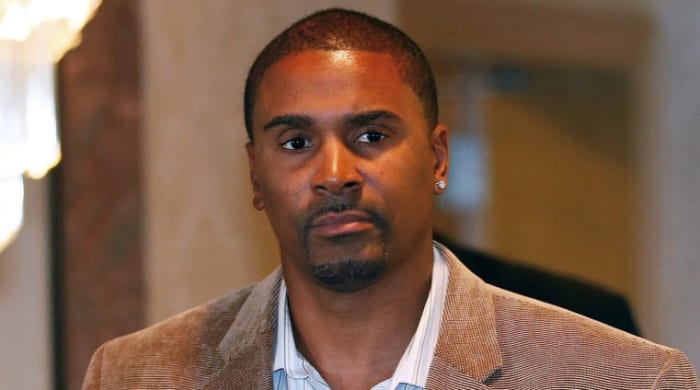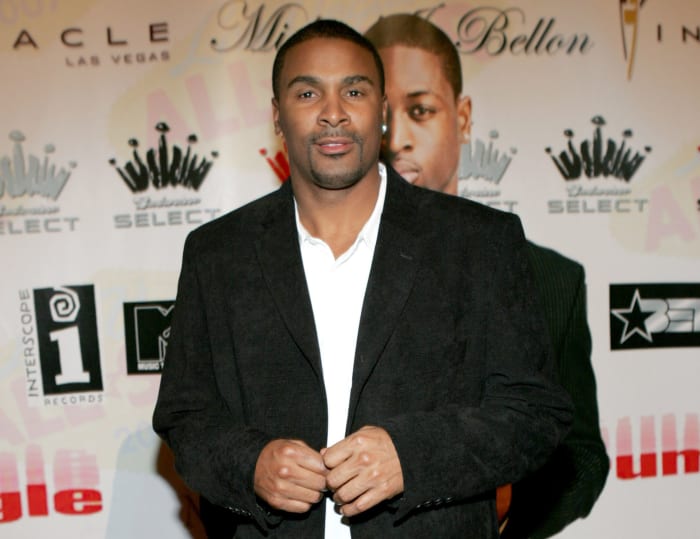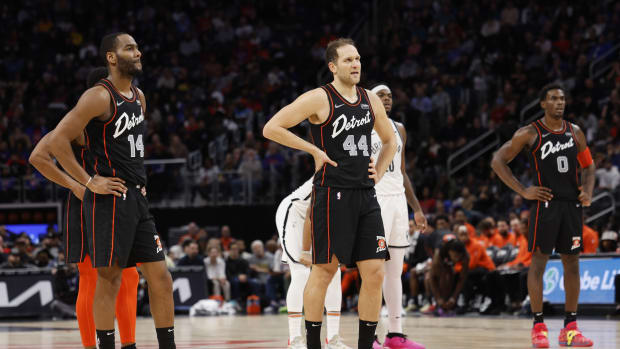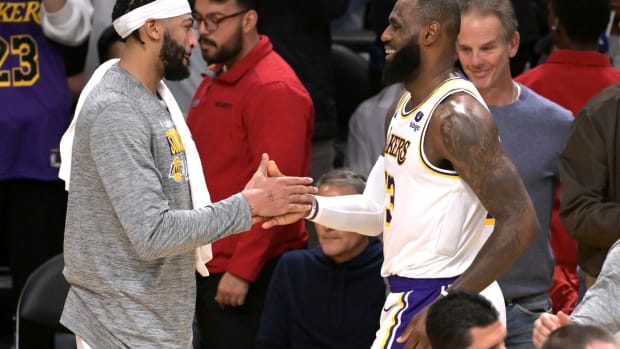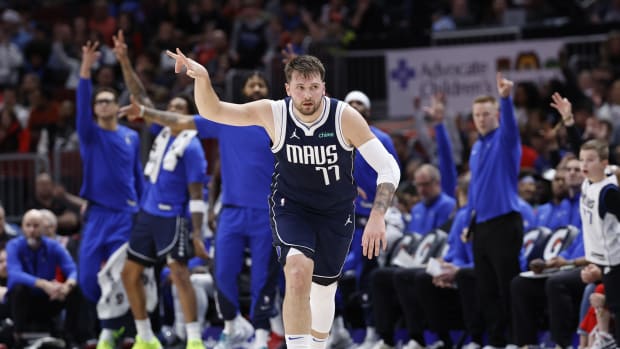Evaluating Eric Murdock's Civil Rights Lawsuit Against United Airlines
Former NBA point guard Eric Murdock and a fellow passenger on a United Airlines flight have filed a federal civil rights lawsuit against the airline. They argue that a flight attendant used “race-baiting” tactics to confront and humiliate them during a seating dispute.
The complaint, filed in the U.S. District Court for the Eastern District of New York, demands at least $10 million in damages. U.S. District Judge Kiyo Matsumoto, who presided over the securities fraud trial of controversial hedge fund manager Martin Shkreli, will preside over Murdock’s litigation.
A skilled point guard who became a whistleblower
Murdock, 50, might not be a familiar name to NBA fans who are millennials and Gen Z. However, for Gen X and up, the name will ring a bell.
Selected by the Utah Jazz in the first round (21st overall) of the 1991 NBA Draft, Murdock developed into a solid NBA point guard. The former Providence College star was often praised for his hustle and toughness. Murdock would play for seven NBA teams, including the Jazz, Milwaukee Bucks and the Miami Heat, between 1991 and 2000. Although never a star, Murdock enjoyed several impressive seasons, including in ‘93-94 when he averaged 15.3 points and 6.7 assists per game and finished sixth in the NBA in three-point field percentage. Murdock also led the NBA in steal percentage in the ’95-’96 season. The one-time backup to John Stockton would amass considerable earnings while in the NBA: Basketball Reference indicates that Murdock earned a combined $11.2 million in NBA contracts.
After Murdock left the NBA, he continued his hoops career in the Continental Basketball Association and then in Italy. Murdock’s professional playing days came to an end in 2004, when he played for the Iowa Stampede of the NBA’s D-League (now named G-League).
SHARP: Paul George's Rebirth, State of the Rockets and More
Murdock then pursued other professions, including collegiate athletic administration. He received extensive media attention while he served as director of player development for the Rutgers men’s basketball team between 2010 and 2012. Murdock played an instrumental role in outing head coach Mike Rice’s bullying of players.
Acting as a whistleblower, Murdock revealed to the public a video of Rice grabbing, shoving, kicking and, in close range, hurling basketballs at players. Rice is also shown screaming homophobic slurs and profanities at these students. Murdock, who had previously complained to Rutgers leadership about Rice’s hostile interactions with players, regarded Rice’s behavior as racially abusive. In an audio recording detailed by Jack Stripling of The Chronicle of Higher Education, Murdock charged that Rice treated Scarlet Knights players “like slaves” and Murdock likened Rice’s coaching tactics to “cracking the whip.”
Rutgers fired Rice in response the scandal. The aftermath eventually impacted Murdock as well when the university declined to renew his contract for 2013. Murdock responded by suing Rutgers in New Jersey Superior Court. He argued wrongful termination as well as other claims. One of those other claims concerned the state’s whistleblower protection law, with Murdock asserting that the university had let him go because he had exposed the failure of university administrators to heed Murdock’s warnings. The case would be settled out of court, with Murdock reportedly receiving $500,000.
A controversy over an empty emergency row
Murdock now finds himself in the center of an airplane seating dispute that might have been racially charged. In July, Murdock flew from New Jersey to Las Vegas to attend a conference hosted by the National Basketball Retired Players Association. Brenda Williams, who is described in her and Murdock’s complaint as African-American and a resident of New Jersey, had also flown from New Jersey to Las Vegas to attend a conference.
Murdock and Williams had never met before July 13, the day both would return home on a United Airlines flight. They would soon become acquainted on United Flight 1537, which would fly from McCarran International Airport to Newark International Airport. Murdock, who stands 6’1", and Williams were seated adjacent to one another. Murdock’s son was also a passenger though he was not seated near his father. Murdock was assigned to seat 15-E, a center row seat, and his son was assigned to seat 36-H.
Before the plane took off, Murdock glanced at the row behind him, row 16. He noticed that it was the emergency row and was empty. Murdock then asked a flight attendant, whose name is unmentioned but is called “Jane Roe” for purposes of the complaint, if he and his son could sit in row 16. Roe, according to Murdock, said something to the effect of “sure, so long as ticketed passengers for that row do not show up and so long as you pay the premium price for the seats.” Murdock then offered to pay the premium price. Roe told him he would have to pay at the ticket counter, but that method of payment had been rendered impossible given that the cabin door had already closed.
Minutes later, an unnamed passenger with a ticketed seat for row 16 sat behind Murdock. The passenger then learned that Murdock wished to sit next to his son. Appreciative of how any parent would prefer to set next to their child on a cross-country flight, the passenger offered to change seats with Murdock. Gratefully, Murdock agreed and then took the seat in row 16. Murdock’s son then joined him in row 16. Murdock says Roe was aware of these seating changes and had “approved” them.
However, right before flight 1537 took off, a different flight attendant “demanded” that Murdock and his son return to their assigned seats. This flight attendant is called “Jane Doe” in the complaint and is described as a white woman. Doe is a co-defendant of her employer, United Airlines, in Murdock and Williams’s lawsuit. Under the legal doctrine of “respondeat superior,” United, as an employer of Doe, is generally responsible for unlawful acts committed by Doe within the course of her employment.
Doe stressed that Murdock hadn’t paid the premium price for row 16. Murdock responded that he would gladly pay the premium price and asked what it was. Doe, Murdock claims, initially didn’t know the price but then recalled it. Yet she could not explain how Murdock could pay given that the cabin door had already been shut. According to Murdock, Doe also didn’t care that the assigned passenger for row 16 had voluntarily relinquished his seat to Murdock. She further admonished Murdock that row 16 had to remain “clear and unoccupied” since it was an emergency row—even though passengers routinely sit in emergency rows and even though another passenger had just been sitting in that row before agreeing to give up his seat to Murdock.
Although perplexed by Doe’s behavior—which Murdock termed “rude and dismissive”—Murdock and his son returned to their ticketed seats. Shortly thereafter, flight 1537 took off.
About a half hour into the flight, Murdock became irritated when another passenger, described only as a white woman, moved from her assigned seat to row 16. Doe, Murdock says, not only declined to ask the woman to return to her ticketed seat—as she had demanded of both Murdock and his son—but went so far as to offer this woman beverage service.
An aggravated Murdock then decided to get up from row 15 and sit in row 16 next to the woman. As Murdock stood to leave left row 15, Williams also stood up so that she could walk to the lavatory. Murdock’s move was not well received by Doe. He recalls her ordering him back to row 15. In response to Doe’s order, Murdock inquired why he was disallowed from sitting in row 16 whereas the woman passenger could sit there. Doe, Murdock says, curtly told him that it was “none of his business” and that he needed to get back to his assigned seat.
As tensions rose between Murdock and Doe, Williams walked back from the lavatory towards her seat in row 15. While doing so, Williams noticed Doe’s animated behavior. She regarded it as completely inappropriate. In fact, in her and Murdock’s complaint, Williams describes Doe as “aggressive and disrespectful.” As she neared her seat and saw Doe scold Murdock, Williams injected herself into the situation. She asked Doe why she would behave in such a discourteous manner towards a passenger who had paid Doe’s employer for the right to fly on the plane. According to Williams, Doe scoffed that it was “none of her business.”
The situation only worsened when Doe took a closer look at Williams and saw that she was holding a phone. Williams insists that she was not recording the incident. Doe apparently assumed otherwise and yelled at Williams to both stop her alleged recording and surrender her phone. Williams categorically refused to hand over her phone. Then, in a “threatening and intimidating voice,” Doe yelled at Williams, “Erase the video now, or give me your phone! It’s against the law to record me!”
WOO: How Far Can Kemba Walker Take the Hornets?
As Williams continued to refuse to relinquish her phone, Doe unsuccessfully attempted to grab it. Williams asserts that Doe’s movement towards her caused her to feel “imminent apprehension and fear of unwanted bodily contact.” This attempted phone crab also led Doe to extend her arms, lean over and place her head within inches of Murdock—a move that prompted Murdock to warn her to “get out of my personal space!” At the request of the other flight attendant, Murdock then returned to his seat.
Tensions then dissipated somewhat. However, a short while later, Doe, in a “snide and condescending tone,” asked Murdock if he wanted a beverage or if he was “going to boycott” instead. Murdock said he did not respond to “the obvious race baiting” and “maintained a dignified silence.”
The situation only worsened when flight 1537 landed in Newark International Airport. The pilot directed the passengers to remain in their seats due to a so-called “security situation.” Security then escorted Murdock and Williams off the plane. This occurred in front of other passengers, who presumably watched while wondering if Murdock and Williams had broken laws or were otherwise in trouble. Some of those passengers, the complaint contends, were current and former pro athletes who knew Murdock. Murdock and Williams were then interviewed by four armed members of the Transportation Security Administration. They were then released and were allowed to retrieve their luggage and leave the airport.
Both Murdock and Williams found the experience humiliating, degrading and traumatizing. They also contend that Doe placed them in “imminent fear of an unwanted, offensive physical contact” through her allegedly aggressive maneuvers.
Murdock and Williams bring torts and civil rights claims against United
Murdock and Williams plead 10 claims against United and Doe. In doing so, Murdock and Williams argue that the two defendants are responsible for causing them “mental distress, anguish, personal and professional embarrassment and indignation.” Both plaintiffs are represented by attorney Gary Port of the New York law firm Port and Sava.
One key claim is negligent hiring, training, supervision and retention of Doe. The plaintiffs insist that Doe was totally incompetent and unfit to do her job. Not only was Doe allegedly unfit, but her aggressive behaviors posed “an undue risk” to passengers. Murdock and Williams blame United for failing to take steps to prevent Doe from “disregarding the rights and safety of others.”
In asserting that United was negligent for employing Doe, Murdock and Williams draw attention to the legal obligations of common carriers. A common carrier is a business that transports people and goods. Airlines, trucking companies and taxi cab companies are typical examples of common carriers. Common carriers are responsible for ensuring the safety of passengers and cargo. As part of that responsibility, common carriers must warn passengers about dangerous conditions and also take responsible steps to ensure that passengers are not injured. Here, Murdock and Williams depict Doe as a dangerous condition, and one that United was not only aware of but failed to remedy. In fact, the complaint calls United’s behavior “malicious, oppressive [and] despicable” and indicative of “conscious disregard” towards passengers.
Murdock and Williams also both insist that United, as Doe’s employer, is responsible for Doe’s alleged assaults against them. In a torts lawsuit, assault refers to undertaking an act with the intent to cause someone apprehension of harmful or offensive contact. Assault is not synonymous with battery, which entails the actual act of touching and causing harm or offense. Here, Murdock and Williams argue that Doe’s attempt to grab Williams’s phone and placing her face next to Murdock constituted assaults. Both Murdock and Williams swear they feared an enraged Doe was on the verge of making unwanted contact.
ROSENBERG: Suns Need a Better Owner, Not a Better Arena
The lawsuit also raises claims for intentional infliction of emotional distress, negligent infliction of emotional distress and false imprisonment. The multiple claims for infliction of emotional distress refer to Doe intentionally or recklessly engaging in extreme and outrageous conduct as a means of causing Murdock and Williams severe emotional distress. As detailed above, Doe is accused of using “outrageous” acts to cause the two passengers to “suffer shock, humiliation, embarrassment, trepidation, fright, nervousness, grief, anxiety, worry, mortification, indignity and extreme and enduring emotional distress.” As to the false imprisonment claim, it asserts that United is responsible for making Murdock and Williams feel as feel as if they had no reasonable escape from the situation. Both were detained by TSA for what the complaint contends was “an appreciable amount of time.” Murdock and Williams aver that they were “emotionally harmed by such restraint, confinement, and detainment and embarrassed before the public.”
The most explosive claims in the complaint are those that argue that Murdock and Williams were subjected to unlawfully racist treatment. The pair raise two claims along those lines.
First is a “Section 1981” claim. Section 1981 of Title 42, a statute originally passed during the Reconstruction Era, empowers citizens to sue private companies if the company discriminated on the basis of race (or on the basis of another protected demographic category) in a contract matter. Here, Murdock and Williams argue that United, through Doe, discriminated on the basis of their race. Such discrimination, the plaintiffs contend, deprived them of rights contractually accorded to them in their tickets. Airplane tickets are a type of contract between a passenger and an airline. Murdock and Williams insist that Doe assaulted and terrorized them at least in part because they are African-American. Doe’s allegedly preferable treatment of the white woman who sat in row 16 could advance such a contention. Further, Doe’s alleged reference to Murdock “going to boycott” could be racially coded language. After all, “boycott” could be historically linked to the Montgomery Bus Boycott.
The second claim asserting racist treatment is that United violated Title VI of the Civil Rights Act of 1964. Title VI forbids any institution that receives federal financial assistance from discriminating on the basis of race (or gender, religion or national origin). Murdock and Williams stress that United is the recipient of federal funds—a point evidenced by the myriad ways in which the federal government financially assists airlines. They argue that Doe sought to humiliate them at several points, including when she allegedly “arranged for the plaintiffs to be made a public spectacle by having them escorted off of the plane as security risks and to be detained by the TSA.” Such adverse actions, Murdock and Williams argue, were based on the fact that they are African-American.
How United will defend itself
In response to the complaint, United released a statement to media companies in which it expressed, “At United, we proudly hold ourselves to the highest standards of professionalism and have zero tolerance for discrimination of any kind. We are looking into the allegations, and because of the pending litigation, we are unable to provide further comment.”
This will not be United’s last word on the matter. Attorneys for the airline will soon answer Murdock and Williams’s complaint. In doing so, they will likely offer an alternative set of facts that refutes or at least complicates assertions made by Murdock and Williams.
To that end, the airline might depict Murdock and Williams as disruptive and non-compliant to instructions designed to ensure passenger safety. Murdock and Williams both purchased United tickets, which means they were obligated to adhere to United’s “contract of carriage.” Such a contract contains the terms of the agreement between the airline and its passengers. United’s contract makes clear that the airline has substantial authority to remove passengers who are “disorderly” or who “fail to comply with or interfere with” the flight crew. United could argue that Murdock and Williams’s disagreement with Doe, and Murdock’s refusal to sit in his assigned seat, warranted their expulsion. To the extent United identifies other passengers who are willing to testify and offer commentary that depicts Murdock and Williams in a less flattering light than their complaint offers, the better legal position for the airline.
As passengers, Murdock and Williams had also contractually assented to adhere to United’s electronic devices policies. These policies indicate that passengers can use photography and video while on board so long as such use is to “capture personal events.” To the extent Williams’s interaction with Doe was a personal event, Doe had no right to demand Williams turn over her phone. At the same time, these same policies caution that “any photographing or recording that creates a safety or security risk or that interferes with crew members’ duties is prohibited.” This language probably didn’t give Doe a right to demand the phone, but it may have allowed her to demand that Williams not record her (Williams insists she did not record).
WILDER: Krauskopf Joins Pacers as First Female Assistant GM
The airline can also stress that even if the passenger in row 16 voluntarily gave up his seat to Murdock, that does not entitle either to change seats. Airline companies can enforce assigned seating. This is particularly true given the price differential in seating. Also, pilots are mindful of the potential safety and efficiency impacts of how evenly passenger weight is distributed in the cabin.
In addition, expect United to challenge the complaint’s contention that a civil rights violation occurred. United might assert that Murdock and Williams being African-American played no role in the incident. To claim otherwise, United might insist, would be to invite speculation. United would bolster its defense if it can show a non-race-related reason as to why the white woman who sat in row 16 was, unlike Murdock, allowed to remain there despite lacking a ticket for that seat. United would also gain by showing that it requires employees to undergo diversity training and that it monitors employees to ensure they treat all passengers with respect and dignity.
Also, the airline will portray the complaint’s damages figure as excessive and unsupported by evidence. Even if Murdock and Williams can prove that they were unlawfully harmed, it’s unclear why such harm would amount to $10 million in damages. Neither Murdock nor Williams suffered what would traditionally be classified as a “physical injury”—neither endured contact, let alone injurious contact. As to emotional trauma and mental distress, the court will likely demand that the plaintiffs specify how each has—as they put it—suffered “shock, humiliation, embarrassment, trepidation, fright, nervousness, grief, anxiety, worry, mortification, indignity and extreme and enduring emotional distress.”
Along those lines, it is reasonable to expect that Murdock and Williams felt outrage and humiliation by what transpired. The degradation and embarrassment of being escorted out of a plane as if they were criminals would make anyone upset. To the extent the experience reflected racist attitudes on the part of the flight attendant, Murdock and Williams’s feelings of injustice would rightfully amplify. But how long did those feelings persist and what did the plaintiffs do about them? Have they sought medical care from a physician or a therapist? Are they taking medications? These and other questions would help to clarify the severity of the harm and the legal justification for $10 million in damages.
Likewise, it’s unclear to what extent (if any) the plane incident has professionally impacted either Murdock or Williams. The incident did not appear to generate any media attention back in July, and there was no video of it. Also, Murdock and Williams were not arrested, so the incident won’t appear on any background check (although, by virtue of Murdock and Williams filing a lawsuit, the incident will now appear on any background check that involves a basic Google search or one that reviews involvement in civil litigation). From what we know, it does not appear that the incident has adversely impacted Murdock or Williams’s careers.
United could look to settle in order to avoid discovery
Rather than wage a long litigation, United could offer Murdock and Williams an attractive financial settlement to end the case. As explained above, United has reason to feel confident in its legal position. However, the airline must also be mindful of the potential adverse public relations that might result from the lawsuit advancing.
Also, United, like any corporate defendant, may worry about what could turn up in pretrial discovery. Murdock and Williams will demand that United turn over its entire file on the allegedly-racist flight attendant. If the company had previously received and failed to act upon race-related complaints about her or other flight attendants, it could prove reputationally damaging to United and its public-traded parent company, United Continental Holdings. United executives could also be asked to answer questions under oath about steps taken by the airline to ensure that its flight attendants are respectful to all passengers and customers.
The Crossover will keep you updated on the Murdock case.
Michael McCann is SI’s legal analyst. He is also Associate Dean of the University of New Hampshire School of Law and editor and co-author of The Oxford Handbook of American Sports Law and Court Justice: The Inside Story of My Battle Against the NCAA.






























